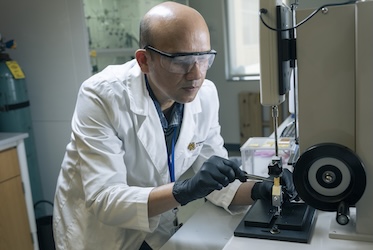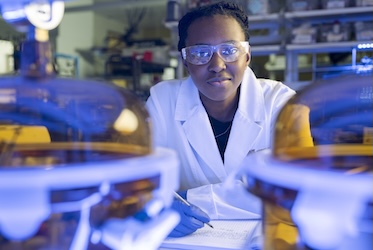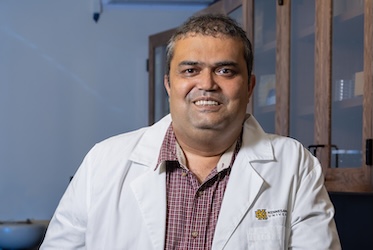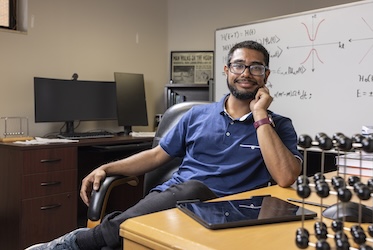
Developmental biologist receives NSF grant
KENNESAW, Ga. | Feb 26, 2021
Kennesaw State University professor Anton Bryantsev has received a grant from the National Science Foundation to study organization of the cell nucleus.

“This grant is the culmination of years of preparative work, as well as of the support of my colleagues and administration,” said Bryantsev, an assistant professor of developmental biology in the Department of Molecular and Cellular Biology. “The College of Science and Mathematics provided a seed grant for me to obtain preliminary data, and the Summer Research Fellows program gave me the time to work on my grant proposal. This support, plus the work of the students in my lab, pushed my ideas to success.”
Bryantsev said his lab’s work sheds light on the regulation of nuclear proteins, which has implications for modifying genomes and changing the traits of cells and organisms. He said his laboratory seeks to influence nuclear processes for research and biotechnological needs.
“There is a need in biotechnology to go into the nucleus where we want to change the traits and behavior of cells,” he said. “Surprisingly, with all the recent advancements in biotechnology, scientists don’t really have a comprehensive picture of how proteins get sorted inside the nucleus. Hopefully, through our experiments, we will get some insights about this aspect of nuclear functioning to make biotechnology techniques safer, reproduceable and more efficient.”
Bryantsev, who credits undergraduate and graduate student researchers for helping him on this project, said that funds from the grant will expand opportunities for student involvement.
“The role of students in my lab cannot be understated,” he said. “We have a very good cohort of students genuinely interested in research, trying to figure out what’s going on inside cells. We’re building their skills and they use those abilities, along with their enthusiasm and energy, to do research that produces cool results. They are truly the driving force within in my lab.”
The grant was funded through an NSF program called Facilitating Research at Primarily Undergraduate Institutions (RUI). This funding opportunity’s objective is to engage RUI faculty members in their professional fields, build capacity for research at their institutions, and support the engagement of undergraduate researchers. The RUI program is open to predominantly undergraduate institutions that offer undergraduate and graduate degrees in NSF-supported fields, who have awarded 20 or fewer doctoral degrees in all NSF-supported fields during the combined previous two academic years.
Bryantsev’s application was a result of his participation in the 2020 Summer Research Fellows program, an initiative developed by Kennesaw State’s Office of Research to support faculty in their pursuit of external research funding, especially opportunities involving undergraduate researchers.
The grant started February 1 and will end January 31, 2024.
– Dave Shelles
Photos by David Caselli
Related Stories

Kennesaw State researcher tackling sustainability through use of transparent wood

Chemistry student engaged in sustainable catalyst research through Kennesaw State's First-Year Scholars program

Kennesaw State researchers awarded Department of Energy grant to investigate materials that boost energy-efficient technologies

Kennesaw State physics student awarded Goldwater Scholarship
A leader in innovative teaching and learning, Kennesaw State University offers undergraduate, graduate, and doctoral degrees to its more than 47,000 students. Kennesaw State is a member of the University System of Georgia with 11 academic colleges. The university’s vibrant campus culture, diverse population, strong global ties, and entrepreneurial spirit draw students from throughout the country and the world. Kennesaw State is a Carnegie-designated doctoral research institution (R2), placing it among an elite group of only 8 percent of U.S. colleges and universities with an R1 or R2 status. For more information, visit kennesaw.edu.















